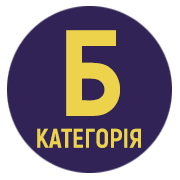DEVELOPLENT OF UNIVERSITY STUDENTS’ COGNITIVE ABILITIES AND COGNITIVE ACTIVITY
Abstract
The article reveals the ways to improve university students’ cognitive abilities and the means of developing and activating their cognitive activity. It is outlined that students’ cognitive activity is determined by the peculiarities of their physical and mental development, individual differences, the specifics of educational environment of a higher education setting and the socio-cultural environment. The ways to improve university students’ cognitive abilities are characterized. They are: systematic training and formation of students’ strong knowledge; development and improvement of their practical skills, abilities and mental processes; organization of communication and cooperation between participants in the educational process; development of critical thinking; use of technological means to promote cognitive development; care for students’ mental health and promotion of their cognitive development. The means of developing and activating students’ cognitive activity are determined. They are: the content of educational material (selection of the content of textbooks, their structural design, the use of interesting information, facts related to regularities, revealing the causes of phenomena, the novelty of educational material); forms of organization (individual, group and mass ways of organizing work, their alternation, interesting independent work and extracurricular activities) and teaching methods (visual, practical, verbal methods, games, discussions, situations of success and situations of choice in learning); implementation of interdisciplinary integration in training process; combination of students’ independent learning and cooperative learning; ensuring personalized development of students’ cognitive abilities; introduction of the latest educational technologies; formation of an effective mechanism of assessment and feedback for regular assessment of the results of the learning process; formation of a favorable microclimate of the educational process.
References
Подоляк, Л. Г., Юрченко, В. І. (2006). Психологія вищої школи. К.: ТОВ «Філ-студія». 320 с.
Кузнєцов, М. А., Фоменко, К. І., Кузнецов, О. І. (2015). Психічні стани студентів у процесі навчально-пізнавальної діяльності. Харків: ХНПУ імені Г. С. Сковороди. 338 с.
Циганчук, Т. В. (2011). Динаміка переживання стресів студентами вищих навчальних закладів: автореф. дис ... канд. псих. наук: 19.00.01. Київ. 20 с.
Chen Jing, Zhang Wei. (2024). Research on the relationship between cognitive processes and learner motivation. Foreign Languages, 40(2), 134–140.
Liu Yang, Zhao Xiaohong. (2024). Application and practice of cognitive flexibility theory in higher education. Higher Education Research, 35(4), 78–85.
Wang Gang, Liu Jun. (2024). Research on cognitive processes and learning effects from the perspective of educational psychology. Psychological Science, 37(2), 456–462.
Wiggins, G. (1998). Educational Psychology: A Practitioner's Guide. New York: John Wiley & Sons.
Лозова, В. І. (1990). Пізнавальна активність школярів: (спецкурс із дидактики). Харків: Основа. 89 с.
Шмир, М. Ф. (2016). Активізація навчально-пізнавальної діяльності студентів у контексті діяльнісного підходу. Збірник наукових праць Херсонського державного університету. Педагогічні науки, 72(2), 63–66.
Liu Xiaohong, Wang Ming. (2023). Research on classroom teaching innovation integrating cognitive science and educational technology. Audio-visual Education Research, 44(6), 90–96.
Qian Ming, Li Jing. (2024). Research on the application of cognitive development theory in middle school mathematics teaching. Journal of Mathematics Education, 25(1), 56–62.
Zhang Li, Li Hua. (2023). Research on optimization strategies of cognitive science and online learning experience. Modern Educational Technology, 33(5), 89–95.
Zhao Yang, Chen Xiaoyan. (2023). Classroom teaching design and practice based on cognitive psychology. Curriculum·-Textbook·Teaching Methods, 33(8), 67–73.
Palincsar, A. S., & Brown, A. L. (1984). Reciprocal teaching of comprehension-fostering and comprehension-monitoring activities. Cognition and Instruction, 1(2), 117–175.





